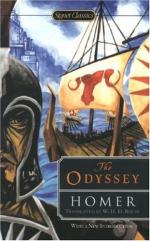So saying she lashed the mules with her whip and they left the river. The mules drew well, and their hoofs went up and down upon the road. She was careful not to go too fast for Ulysses and the maids who were following on foot along with the waggon, so she plied her whip with judgement. As the sun was going down they came to the sacred grove of Minerva, and there Ulysses sat down and prayed to the mighty daughter of Jove.
“Hear me,” he cried, “daughter of Aegis-bearing Jove, unweariable, hear me now, for you gave no heed to my prayers when Neptune was wrecking me. Now, therefore, have pity upon me and grant that I may find friends and be hospitably received by the Phaeacians.”
Thus did he pray, and Minerva heard his prayer, but she would not show herself to him openly, for she was afraid of her uncle Neptune, who was still furious in his endeavors to prevent Ulysses from getting home.
Book VII
Reception of Ulysses at the palace of king Alcinous.
Thus, then, did Ulysses wait and pray; but the girl drove on to the town. When she reached her father’s house she drew up at the gateway, and her brothers—comely as the gods—gathered round her, took the mules out of the waggon, and carried the clothes into the house, while she went to her own room, where an old servant, Eurymedusa of Apeira, lit the fire for her. This old woman had been brought by sea from Apeira, and had been chosen as a prize for Alcinous because he was king over the Phaeacians, and the people obeyed him as though he were a god. {57} She had been nurse to Nausicaa, and had now lit the fire for her, and brought her supper for her into her own room.
Presently Ulysses got up to go towards the town; and Minerva shed a thick mist all round him to hide him in case any of the proud Phaeacians who met him should be rude to him, or ask him who he was. Then, as he was just entering the town, she came towards him in the likeness of a little girl carrying a pitcher. She stood right in front of him, and Ulysses said:
“My dear, will you be so kind as to show me the house of king Alcinous? I am an unfortunate foreigner in distress, and do not know one in your town and country.”




